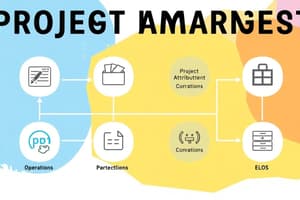Podcast
Questions and Answers
What is primarily measured for project success?
What is primarily measured for project success?
- Team performance
- Risk management
- Customer satisfaction
- Scope, time, and cost goals (correct)
Portfolio Managers are responsible for managing individual projects.
Portfolio Managers are responsible for managing individual projects.
False (B)
What role do Program Managers have in relation to project staff?
What role do Program Managers have in relation to project staff?
Program Managers manage the program staff and the project management staff.
Success is measured by the degree to which the program satisfies the needs and benefits for which it was _____.
Success is measured by the degree to which the program satisfies the needs and benefits for which it was _____.
Match the management roles with their respective focus:
Match the management roles with their respective focus:
What is one aspect that helps a project succeed?
What is one aspect that helps a project succeed?
Which statement accurately describes Portfolio Management?
Which statement accurately describes Portfolio Management?
Success in project management only relies on meeting budget guidelines.
Success in project management only relies on meeting budget guidelines.
Project Management typically has a broader scope than Program Management.
Project Management typically has a broader scope than Program Management.
How do Portfolio Managers measure success?
How do Portfolio Managers measure success?
What do Program Managers expect in terms of change?
What do Program Managers expect in terms of change?
__________ aligns with organizational strategies by selecting the right programs and projects.
__________ aligns with organizational strategies by selecting the right programs and projects.
What is the primary role of Project Management?
What is the primary role of Project Management?
Match the following management types with their key functions:
Match the following management types with their key functions:
Portfolio managers continuously monitor changes in specific projects only.
Portfolio managers continuously monitor changes in specific projects only.
What type of scope do Portfolios have?
What type of scope do Portfolios have?
Which of the following is NOT a requirement for project managers regarding the Code of Ethics and Professional Conduct?
Which of the following is NOT a requirement for project managers regarding the Code of Ethics and Professional Conduct?
A project is defined as a temporary endeavor undertaken to create a product or service with a definite beginning and end.
A project is defined as a temporary endeavor undertaken to create a product or service with a definite beginning and end.
What are the five project management exams mentioned that require acceptance of the Code of Ethics?
What are the five project management exams mentioned that require acceptance of the Code of Ethics?
A project may be terminated if the _____ wishes to terminate it.
A project may be terminated if the _____ wishes to terminate it.
Match the following terms with their descriptions:
Match the following terms with their descriptions:
Which of the following statements about projects is correct?
Which of the following statements about projects is correct?
Projects have social, economic, and environmental impacts that are often short-lived.
Projects have social, economic, and environmental impacts that are often short-lived.
What does the 'temporary' nature of a project refer to?
What does the 'temporary' nature of a project refer to?
Which of the following is NOT a type of result a project can create?
Which of the following is NOT a type of result a project can create?
A project is permanent and ongoing.
A project is permanent and ongoing.
What is the primary difference between a project and a program?
What is the primary difference between a project and a program?
A project ends when its objectives have been __________.
A project ends when its objectives have been __________.
Match the following terms with their descriptions:
Match the following terms with their descriptions:
Which of the following is an example of a project?
Which of the following is an example of a project?
A project can exist independently of a program.
A project can exist independently of a program.
Which of the following is NOT one of the five Process Groups in project management?
Which of the following is NOT one of the five Process Groups in project management?
Name an attribute that all projects share.
Name an attribute that all projects share.
User involvement is more important than executive management support in project success criteria.
User involvement is more important than executive management support in project success criteria.
What is the definition of project management?
What is the definition of project management?
The relative importance of clear statement of requirements is _____ out of 100.
The relative importance of clear statement of requirements is _____ out of 100.
Match the following project management constraints with their descriptions:
Match the following project management constraints with their descriptions:
Which project management process group primarily focuses on executing the project plan?
Which project management process group primarily focuses on executing the project plan?
Balancing competing project constraints is solely the responsibility of the project manager.
Balancing competing project constraints is solely the responsibility of the project manager.
What happens if the schedule is shortened without a corresponding budget increase?
What happens if the schedule is shortened without a corresponding budget increase?
What is the primary purpose of a Project Management Office (PMO)?
What is the primary purpose of a Project Management Office (PMO)?
Progressive elaboration allows for a detailed plan development only at the end of the project.
Progressive elaboration allows for a detailed plan development only at the end of the project.
List two advantages of using formal project management.
List two advantages of using formal project management.
Projects are often authorized due to market demand, strategic opportunity, or ______.
Projects are often authorized due to market demand, strategic opportunity, or ______.
Match the advantages of project management to their descriptions.
Match the advantages of project management to their descriptions.
What role does a PMO play in achieving an organization's strategic objectives?
What role does a PMO play in achieving an organization's strategic objectives?
Increasing profit is one of the goals of effective project management.
Increasing profit is one of the goals of effective project management.
What does the iterative development of the project management plan involve?
What does the iterative development of the project management plan involve?
Flashcards
Portfolio Management
Portfolio Management
Selecting, prioritizing, and resourcing programs and projects aligned with organizational strategies.
Program Management
Program Management
Harmonizing projects within a program, controlling dependencies, and delivering specified benefits.
Project Management
Project Management
Developing and implementing plans to achieve project scopes, driven by program/portfolio objectives.
Portfolio Scope
Portfolio Scope
Signup and view all the flashcards
Project Scope
Project Scope
Signup and view all the flashcards
Program Scope
Program Scope
Signup and view all the flashcards
Organizational Project Management
Organizational Project Management
Signup and view all the flashcards
Change Management
Change Management
Signup and view all the flashcards
Project Management
Project Management
Signup and view all the flashcards
Program Management
Program Management
Signup and view all the flashcards
Portfolio Management
Portfolio Management
Signup and view all the flashcards
Project Success Criteria
Project Success Criteria
Signup and view all the flashcards
Project Success Factors
Project Success Factors
Signup and view all the flashcards
Project Monitoring & Control
Project Monitoring & Control
Signup and view all the flashcards
Program Monitoring
Program Monitoring
Signup and view all the flashcards
Portfolio Monitoring
Portfolio Monitoring
Signup and view all the flashcards
Project Definition
Project Definition
Signup and view all the flashcards
Project's End Criteria
Project's End Criteria
Signup and view all the flashcards
Project Uniqueness
Project Uniqueness
Signup and view all the flashcards
Project Impact
Project Impact
Signup and view all the flashcards
Project's Tangibility
Project's Tangibility
Signup and view all the flashcards
Project Complexity
Project Complexity
Signup and view all the flashcards
Project Stakeholder Inclusion
Project Stakeholder Inclusion
Signup and view all the flashcards
Project Management Code of Ethics
Project Management Code of Ethics
Signup and view all the flashcards
Project
Project
Signup and view all the flashcards
Project Attributes
Project Attributes
Signup and view all the flashcards
Program
Program
Signup and view all the flashcards
Portfolio
Portfolio
Signup and view all the flashcards
Project vs. Program
Project vs. Program
Signup and view all the flashcards
Project Purpose
Project Purpose
Signup and view all the flashcards
Project Scope
Project Scope
Signup and view all the flashcards
Project vs. Program vs. Portfolio Relationship
Project vs. Program vs. Portfolio Relationship
Signup and view all the flashcards
Project Management
Project Management
Signup and view all the flashcards
Project Success Criteria
Project Success Criteria
Signup and view all the flashcards
Project Constraints
Project Constraints
Signup and view all the flashcards
Project Stakeholders
Project Stakeholders
Signup and view all the flashcards
Project Process Groups
Project Process Groups
Signup and view all the flashcards
Project Scope
Project Scope
Signup and view all the flashcards
Competing Constraints
Competing Constraints
Signup and view all the flashcards
User Involvement
User Involvement
Signup and view all the flashcards
Project Requirements Change
Project Requirements Change
Signup and view all the flashcards
Project Management Plan
Project Management Plan
Signup and view all the flashcards
Progressive Elaboration
Progressive Elaboration
Signup and view all the flashcards
Project Management Office (PMO)
Project Management Office (PMO)
Signup and view all the flashcards
Strategic Planning & Projects
Strategic Planning & Projects
Signup and view all the flashcards
Project Success Factors
Project Success Factors
Signup and view all the flashcards
PMO Responsibilities
PMO Responsibilities
Signup and view all the flashcards
Project Management Advantages
Project Management Advantages
Signup and view all the flashcards
Study Notes
Project Management Overview
- Project Management is defined as the application of knowledge, skills, tools, and techniques to project activities to meet project requirements.
- Project management involves organizing others, not doing the work directly.
- This work is accomplished by following five key process groups: Initiating, Planning, Executing, Monitoring and Controlling, and Closing.
- Projects are temporary endeavors with a defined beginning and end. The "end" occurs when objectives are met or the project is terminated.
- Projects have specific attributes, including being temporary, having a unique purpose, and needing resources.
- Projects can be large or small, and take varying amounts of time to complete, they often involve uncertainty.
Project Attributes
- Projects have a unique purpose.
- Projects are temporary.
- Projects are developed utilizing progressive elaboration.
- Projects require resources.
- Projects can be large or small and take a short or long time to complete.
- Projects should have a primary customer or sponsor.
- Projects inherently involve uncertainty.
Project vs. Program vs. Portfolio
- Projects are relatively isolated endeavors with predetermined goals, scope, time, and budget. They end when objectives are met or when terminated.
- Programs are groups of related projects managed in a coordinated way to obtain benefits and control not available when managing them individually. Success of a program depends on achieving its objective.
- Portfolios are collections of projects or programs grouped together to optimize management and meet strategic business objectives. Portfolios are driven by the strategic objectives of the organization.
Project Management Office (PMO)
- A PMO is a management structure that standardizes project-related governance processes and facilitates sharing resources, methodologies, tools, and techniques.
- PMOs can provide project management support functions to actually manage projects directly.
- They integrate information from corporate strategic projects and evaluate the fulfillment of higher-level strategic objectives.
- PMOs act as the liaison between portfolios, programs, projects, and the organization's measurement systems like balanced scorecards.
- PMOs may have the authority to act as integral stakeholders, make recommendations, or terminate projects to align with business objectives.
- PMOs are involved in the selection, management, and deployment of shared or dedicated project resources.
Project Success
- Project success is achieved when the project meets scope, time, and cost goals.
- Customer/sponsor satisfaction should be met.
- The main objective of the project should also be met (e.g., making or saving money, or providing a good return on investment).
Advantages of Formal Project Management
- Better control of financial, physical, and human resources.
- Improved customer relations.
- Shorter development times.
- Lower project costs.
- Higher quality and increased reliability.
- Higher profit margins.
- Improved productivity.
- Better internal coordination.
- Higher worker morale (less stress).
Project Management Institute Code of Ethics and Professional Conduct
- The code emphasizes responsibility, respect, fairness, and honesty.
- Practitioners must demonstrate ethical and professional conduct.
- Practitioners must uphold applicable laws, regulations, and organizational/professional policies.
- Practitioners come from various backgrounds and cultures, impacting ethical practices universally.
Project Management Exam Requirements
- The code is essential for project managers and required for certain PM exams (CAPM, PMP, PgMP, PMI - ACP, PMI – RMP, PMI – SP).
Projects and Strategic Planning
- Projects are often used to achieve objectives within an organization's strategic plans.
- Project authorization is often driven by market demand, strategic opportunities, social needs, environmental considerations, customer requests, technological advancements, or legal requirements.
Managing a Project
- Managing a project encompasses requirement identification, stakeholder needs and concerns, effective communications, and balancing competing constraints (scope, quality, schedule, budget, resources, and risk).
Sample Scenarios
- If a project's timeline is shortened, an increase in budget may be necessary to allocate more resources.
- If the budget remains static, scope or quality may need to be reduced to execute the remaining project components.
Project Success Criteria
- User involvement, executive management support, clear requirements statement, planning, realistic expectations, smaller milestones, competent staff, ownership, clear vision and objectives, hard-working focused staff are crucial facets to effective projects.
Project Management Process Groups
- Initiating, Planning, Executing, Monitoring and Controlling, and Closing are the five process groups that guide PM projects.
Studying That Suits You
Use AI to generate personalized quizzes and flashcards to suit your learning preferences.




